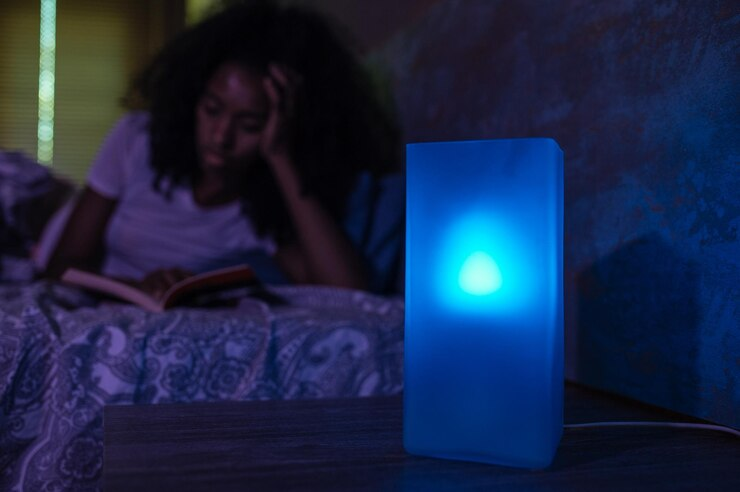In today’s digital age, we are surrounded by screens emitting blue light from various devices such as smartphones, tablets, computers, and televisions. While these devices have become an integral part of our lives, the exposure to blue light, especially in the evening hours, can have a significant impact on our sleep quality. South Africans, like many people worldwide, are increasingly experiencing sleep disturbances, and understanding the role of blue light in sleep disruption is crucial for promoting healthier sleep habits.
What is Blue Light? Blue light is a high-energy, short-wavelength light that is present in natural sunlight. It is beneficial during the day as it helps regulate our circadian rhythm, boosts mood, and promotes alertness. However, in the evening, exposure to artificial blue light can interfere with our body’s natural sleep-wake cycle.
The Effect of Blue Light on Sleep:
- Suppression of Melatonin: Blue light exposure in the evening can suppress the production of melatonin, a hormone that plays a vital role in regulating sleep. Melatonin is typically released in the evening to signal to the body that it’s time to sleep. However, the exposure to blue light can disrupt this process, leading to difficulties falling asleep and a delay in the onset of sleep.
- Delayed Circadian Rhythm: Our body’s internal clock, known as the circadian rhythm, relies on external cues, such as light and darkness, to regulate our sleep-wake cycles. Blue light exposure in the evening can trick our bodies into thinking it’s still daytime, delaying the release of melatonin and shifting our circadian rhythm. This disruption can lead to difficulties falling asleep at a desired time and feeling groggy in the morning.
- Reduced REM Sleep: Rapid Eye Movement (REM) sleep is a crucial stage of sleep associated with memory consolidation, learning, and emotional processing. Exposure to blue light before bedtime has been found to reduce the duration and quality of REM sleep. This can impact cognitive function, mood, and overall sleep satisfaction.
Managing Blue Light Exposure:
- Limit Screen Time Before Bed: To promote better sleep, it’s essential to limit exposure to blue light-emitting devices, such as smartphones, tablets, and computers, in the evening, especially close to bedtime. Establish a screen curfew at least one to two hours before sleep to allow the body to naturally wind down.
- Use Blue Light Filters: Many devices offer built-in features or apps that reduce blue light emission. Enable the “Night Shift” or “Night Mode” setting on your devices to shift the display towards warmer, less stimulating colors. Additionally, there are external blue light filter applications and screen protectors available that can further reduce blue light exposure.
- Wear Blue Light Filtering Glasses: Blue light filtering glasses can be worn in the evening to block or reduce the amount of blue light entering the eyes. These glasses can help minimize the disruption to melatonin production and promote a more natural sleep-wake cycle.
- Opt for Dimmer and Warm Lighting: In the evening, opt for dimmer and warmer lighting in your home. Use soft, warm-colored bulbs or install dimmer switches to create a soothing environment that promotes relaxation and signals to your body that it’s time to wind down for sleep.
- Establish a Sleep-Friendly Bedroom: Make your bedroom a sleep-friendly environment by ensuring it is dark, quiet, and cool. Use blackout curtains or blinds to minimize outside light sources, use earplugs or white noise machines to mask noise disturbances, and maintain a cool temperature for optimal sleep comfort.
- Practice a Relaxing Bedtime Routine: Engage in relaxing activities before bed that help signal to your body that it’s time to sleep. This can include reading a book, taking a warm bath, practicing relaxation techniques such as deep breathing or meditation, or listening to calming music.
By being mindful of our exposure to blue light, especially in the evening hours, South Africans can take proactive steps to improve their sleep quality. Creating a sleep-friendly environment and establishing healthy bedtime routines can contribute to better overall well-being and ensure a restful night’s sleep. Remember, maintaining a healthy sleep pattern is an essential component of a balanced and productive lifestyle.










